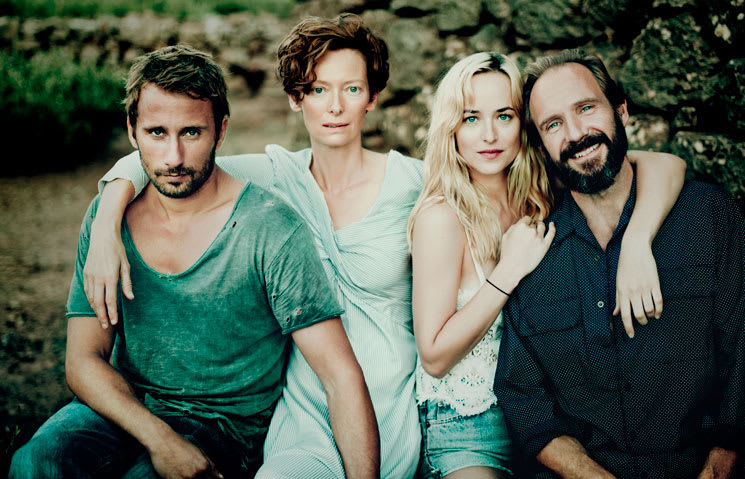Before work began on Italian auteur Luca Guadagnino's latest movie, A Bigger Splash, loosely based upon Jacques Deray's 1969 romantic crime drama La Piscine, the director sat down with screenwriter David Kajganich to watch the original film. They only made it through 30 minutes before turning down the volume and watching the rest with no sound.
It may seem like a gimmicky stunt to spark creativity for some, but the move clearly had an impact on the feel of Guadagnino's first feature in seven years. A Bigger Splash is a big, bold and beautiful film filled with cut scenes, close-ups and drawn out shots that create a subtle sense of claustrophobia and tension throughout. This is visual storytelling at its best, which is rather important to the film considering Tilda Swinton barely says more than 50 words throughout its two-hour runtime.
Swinton plays Marianne Lane, a Patti Smith/Lou Reed/David Bowie-like rock star who takes a vacation with her boyfriend (Matthias Schoenaerts) to Pantelleria — a remote island 100 kilometres southwest of Sicily — while recovering from vocal cord surgery. Their tranquil time away is interrupted by the arrival of Harry Hawkes (Ralph Fiennes), a record producer and former fling, as well as the daughter he only recently realized he had (Dakota Johnson, in her strongest performance yet). Sparks fly almost immediately, as Harry seems dead set on getting back together with Marianne, while his daughter would rather spend her time toying with the singer's younger boyfriend and everyone else around her.
It's a sexually charged piece of cinema to say the least, with much of the film focusing on the four self-absorbed, vaguely neurotic characters fighting for each other's affections. But lurking underneath the central drama, another story unfolds about African refugees seeking solace on the island. That contrast, between the wealthy lives of celebrities like Marianne and her circle, in comparison to people fighting for survival, pushes the movie forward when the vapid interests of its leads get to be a bit too much.
The film loses a bit of steam when it switches gears in the final act from a seductive, self-aware romantic drama to a potboiler crime thriller, but A Bigger Splash more than makes up for it by being one of the best recent looks at the downside and moral decrepitude caused by excessive living.
(Elevation Pictures)It may seem like a gimmicky stunt to spark creativity for some, but the move clearly had an impact on the feel of Guadagnino's first feature in seven years. A Bigger Splash is a big, bold and beautiful film filled with cut scenes, close-ups and drawn out shots that create a subtle sense of claustrophobia and tension throughout. This is visual storytelling at its best, which is rather important to the film considering Tilda Swinton barely says more than 50 words throughout its two-hour runtime.
Swinton plays Marianne Lane, a Patti Smith/Lou Reed/David Bowie-like rock star who takes a vacation with her boyfriend (Matthias Schoenaerts) to Pantelleria — a remote island 100 kilometres southwest of Sicily — while recovering from vocal cord surgery. Their tranquil time away is interrupted by the arrival of Harry Hawkes (Ralph Fiennes), a record producer and former fling, as well as the daughter he only recently realized he had (Dakota Johnson, in her strongest performance yet). Sparks fly almost immediately, as Harry seems dead set on getting back together with Marianne, while his daughter would rather spend her time toying with the singer's younger boyfriend and everyone else around her.
It's a sexually charged piece of cinema to say the least, with much of the film focusing on the four self-absorbed, vaguely neurotic characters fighting for each other's affections. But lurking underneath the central drama, another story unfolds about African refugees seeking solace on the island. That contrast, between the wealthy lives of celebrities like Marianne and her circle, in comparison to people fighting for survival, pushes the movie forward when the vapid interests of its leads get to be a bit too much.
The film loses a bit of steam when it switches gears in the final act from a seductive, self-aware romantic drama to a potboiler crime thriller, but A Bigger Splash more than makes up for it by being one of the best recent looks at the downside and moral decrepitude caused by excessive living.
